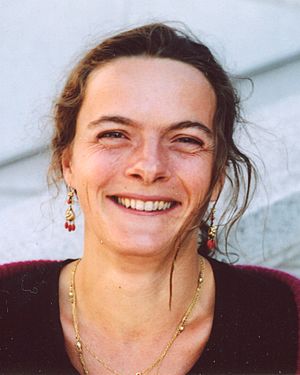Alice Guionnet facts for kids
Quick facts for kids
Alice Guionnet
|
|
|---|---|

Guionnet in 2006
|
|
| Born | 24 May 1969 |
| Nationality | French |
| Alma mater | École Normale Supérieure |
| Awards | Rollo Davidson Prize (2003) Loève Prize (2009) Simons Investigator (2012) |
| Scientific career | |
| Fields | Mathematics |
| Institutions | ENS (Lyon) |
| Doctoral advisor | Gérard Ben Arous |
Alice Guionnet is a brilliant French mathematician. Born on May 24, 1969, she is well-known for her important work in probability theory. This field of math helps us understand chance and how likely events are to happen. She also studies "large random matrices," which are like huge grids of numbers that change randomly.
Contents
About Alice Guionnet
Alice began her advanced studies at a famous school in Paris, France, called the École Normale Supérieure, in 1989. She worked very hard and earned her PhD degree in 1995. Her main teacher for her PhD was Gérard Ben Arous at the University of Paris-Sud.
Her PhD research focused on complex topics like "Langevin Dynamics of spin glass." This shows her early interest in how random systems behave.
Where She Has Worked
Throughout her career, Alice Guionnet has worked at many top universities and research centers around the world. These include the Courant Institute of Mathematical Sciences and MIT in the United States. She also worked at the University of California, Berkeley.
She has held positions at the ENS (Paris) in France. Today, she is a Director of Research at the ENS de Lyon. This means she leads important math research projects.
Her Amazing Math Work
Alice Guionnet is especially famous for her studies on large random matrices. Imagine a giant spreadsheet filled with numbers that are all jumbled up randomly. She helps us understand the patterns that appear in these huge, random grids.
Understanding Random Matrices
- She helped figure out how the numbers in these matrices behave when they get very, very large. This is called "large deviations."
- She used a special math idea called "concentration of measure." This helps show how random numbers tend to group around an average.
- She was one of the first to carefully study matrices where some numbers are much bigger than others.
- She also found out how the "spectral measurement" of non-normal matrices changes. This is like understanding the unique properties of these special number grids.
New Math Tools
Alice also helped create new ways to solve math problems. She developed methods using "Dyson-Schwinger equations." These equations help scientists understand complex systems. She also studied how "beta-models" and "random tilings" work.
In a team with Alessio Figalli, she came up with a new idea called "approximate transport." This helped them show that certain random patterns are "universal," meaning they appear everywhere.
Free Probabilities
Alice Guionnet has also made big discoveries in a field called "free probabilities." This is a special area of math that helps describe random events in a different way.
- She compared different types of "Voiculescu entropies," which are ways to measure randomness.
- Working with Vaughan Jones and Dimitri Shlyakhtenko, she built new mathematical structures called "subfactors."
- She also showed that certain "algebras" (types of math systems) are similar by creating "free transport."
Awards and Honors
Alice Guionnet has received many important awards for her groundbreaking work in mathematics.
- In 1998, she won the Oberwolfach Prize.
- The Rollo Davidson Prize was given to her in 2003 for her work in probability.
- In 2006, the French Academy of Sciences honored her with the Prix Paul Doistau–Émile Blutet.
- She won the prestigious Loève Prize in 2009 for her contributions to probability theory.
- In 2012, she became a Simons Investigator, which is a special award for top scientists.
- She was elected to the French Academy of Sciences in 2017.
- She is also a Fellow of the Institute of Mathematical Statistics.
- In 2018, she received the Blaise Pascal Medal in Mathematics from the European Academy of Sciences.
- She became a member of the Academia Europaea in 2017.
- Since 2012, she has been a Knight of the Legion of Honour, a very high award in France.
- In 2022, she was chosen as an international member of the National Academy of Sciences (NAS) in the U.S. She also became an International Honorary Member of the American Academy of Arts and Sciences (AAAS).
 | Dorothy Vaughan |
 | Charles Henry Turner |
 | Hildrus Poindexter |
 | Henry Cecil McBay |

